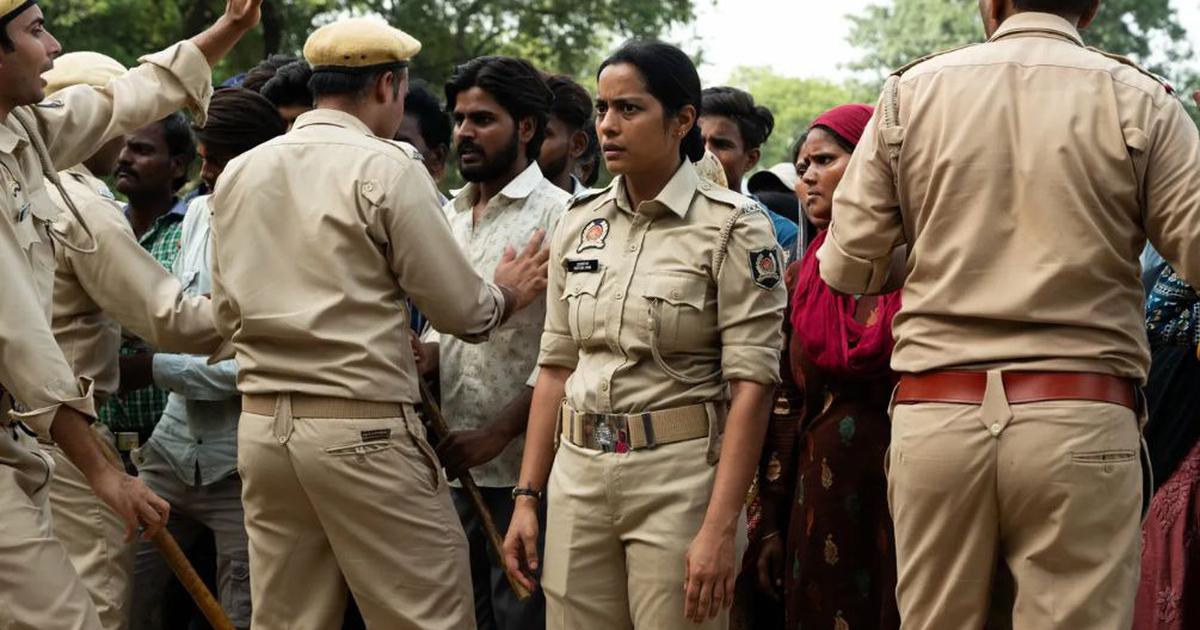Hired on compassionate grounds to replace her police constable husband after his untimely death, Santosh comes to the job with a willingness to serve. She finds her natural empathy tussling with a taste of the authority she has never had.
Routine police work has been gutted by callousness. Sexist chatter is commonplace. Yet, the khaki uniform places Santosh in a position of relative privilege. While Santosh is no stranger to hidebound bias in her own life, a sensitive investigation into the rape and murder of a Dalit teenager tests her mettle.
Sandhya Suri’s Santosh, led by Shahana Goswami, is a thoughtful study of power and powerlessness in Indian policing. The documentary filmmaker’s feature debut has been premiered in the Un Certain Regard section at the Cannes Film Festival (May 14-25).
Set in the fictional north Indian state Chirag Pradesh, Santosh views its titular heroine as both the investigator of and a witness to a horrific crime and its equally terrible aftermath. Suri’s screenplay, neither heavy-handed nor preachy, deftly personalises the manner in which gender dynamics, caste, community honour and religion skewer the pursuit of fairness.
Santosh’s moral predicament, which arises when a suspect appears to fit the bill a bit too perfectly, is similar to the inspector in Govind Nihalani’s Ardh Satya (1983) and the constable in Ivan Ayr’s Soni (2018). Like these characters, Santosh confronts the real nature of law enforcement, which was summed up by Bob Dylan: “To live outside the law, you must be honest.”
Santosh finds an ally in her seasoned superior officer Geeta (Sunita Rajwar). In the hesitant and naive young woman, Geeta sees a younger version of herself.
Yet, Geeta’s company proves double-edged for Santosh – one of the several ways in which Suri’s screenplay complicates the methods used by women to navigate a world determined by men. The relationship between Santosh and Geeta creates some of the film’s most revealing moments.
Santosh’s tentative movements are matched by Lennert Hillege’s sinuous camera. Suri’s non-fiction experience – she has previously made the personal documentary I for India and the archival footage-based Around India With a Movie Camera – is evident in her staging in Santosh.
The approach is observational; the acting as naturalistic as the location shooting. Goswami and Rajawar are the most recognisable members of the cast. Mostly unknown performers ably carry out Suri’s vision of a debased world in which vengeance is a synonym for justice.
The 128-minute movie is bookended by night-time sequences that create a vivid metaphor of Santosh’s journey. The device of a police procedural includes small details that linger in the memory: the uniform belonging to Santosh’s husband swinging from a washing line, making a “kee-kee” sound; a cobbler who also helps supplicants write police complaints.
The character sketching is impeccable too. Sunita Rajawar is fabulous as Geeta, a complex woman whose deportment has been borrowed from her male colleagues but whose understanding of the system is entirely her own.
Much of Shahana Goswami’s terrific performance is conveyed by Santosh’s tense, watchful ways. Her shoulders hunched and her body held taut with only her eyes revealing her emotions, Goswami gives her character enough of an inner life to make the conclusion of Santosh’s journey credible.
Santosh’s experiences are within mostly the realm of plausibility. As Santosh reaches her destination, Suri lets in unlikely – and not entirely earned – rays of hope, only to regain control by cutting to black.
Also read:
How actor Shahana Goswami flies under the radar and above the competition
Scroll has produced award-winning journalism despite violent threats, falling ad revenues and rising costs. Support our work. Become a member today.

In these volatile times, Scroll remains steadfastly courageous, nuanced and comprehensive. Become a Scroll Member and support our award-winning reportage, commentary and culture writing.
